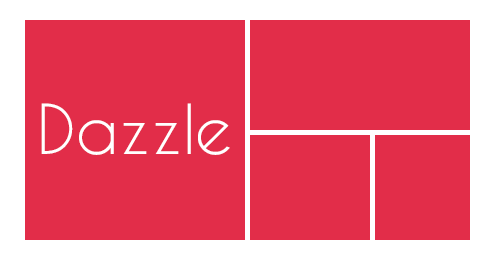Looking for maintainers Raathigesh#41
Dazzle is a library for building dashboards with React JS. Dazzle does not depend on any front-end libraries but it makes it easier to integrate with them.
Dazzle's goal is to be flexible and simple. Even though there are some UI components readily available out of the box, you have the complete control to override them as you wish with your own styles and layout.
- Grid based layout
- Add/Remove widgets
- Drag and drop widget re-ordering
- UI framework agnostic
- Simple yet flexible
- Well documented (It's a feature! Don't you think?)
$ npm install react-dazzle --save
Here is a demo. Widgets shows fake data though but they look so damn cool (At least for me).
import React, { Component } from 'react';
import Dashboard from 'react-dazzle';
// Your widget. Just another react component.
import CounterWidget from './widgets/CounterWidget';
// Default styles.
import 'react-dazzle/lib/style/style.css';
class App extends Component {
constructor() {
this.state = {
widgets: {
WordCounter: {
type: CounterWidget,
title: 'Counter widget',
}
},
layout: {
rows: [{
columns: [{
className: 'col-md-12',
widgets: [{key: 'WordCounter'}],
}],
}],
}
};
}
render() {
return <Dashboard widgets={this.state.widgets} layout={this.state.layout} />
}
}Dazzle uses react-dnd. The default Dashboard component of Dazzle is wrapped by DragDropContext of react-dnd. So you may want to use react-dnd in your React component hierarchy upper than where you use the Dashboard component of Dazzle. If you do so then you can't let Dazzle creating the DragDropContext because you want to create it yourself upper in the React component hierarchy of your application. So forth please use the DashboardWithoutDndContext component of Dazzle and wrapped your own component with DragDropContext(HTML5Backend):
import React, { Component } from 'react';
import { DashboardWithoutDndContext } from 'react-dazzle';
// react-dnd
import { DragDropContext } from 'react-dnd';
import HTML5Backend from 'react-dnd-html5-backend';
// Your widget. Just another react component.
import CounterWidget from './widgets/CounterWidget';
// Default styles.
import 'react-dazzle/lib/style/style.css';
class App extends Component {
constructor() {
this.state = {
widgets: {
WordCounter: {
type: CounterWidget,
title: 'Counter widget',
}
},
layout: {
rows: [{
columns: [{
className: 'col-md-12',
widgets: [{key: 'WordCounter'}],
}],
}],
}
};
}
render() {
return <DashboardWithoutDndContext widgets={this.state.widgets} layout={this.state.layout} />
}
}
export default DragDropContext(HTML5Backend)(App);| Props | Type | Description | Required |
|---|---|---|---|
| layout | Object | Layout of the dashboard. | Yes |
| widgets | Object | Widgets that could be added to the dashboard. | Yes |
| editable | Boolean | Indicates whether the dashboard is in editable mode. | No |
| rowClass | String | CSS class name(s) that should be given to the row div element. Default is row. |
No |
| editableColumnClass | String | CSS class name(s) that should be used when a column is in editable mode. | No |
| droppableColumnClass | String | CSS class name(s) that should be used when a widget is about to be dropped in a column. | No |
| frameComponent | Component | Customized frame component which should be used instead of the default frame. More on custom frame component. | No |
| addWidgetComponent | Component | Customized add widget component which should be used instead of the default AddWidget component. More on custom add widget component. | No |
| addWidgetComponentText | String | Text that should be displayed in the Add Widget component. Default is Add Widget. |
No |
| onAdd(layout, rowIndex, columnIndex) | function | Will be called when user clicks the AddWidget component. |
No |
| onRemove(layout) | function | Will be called when a widget is removed. | No |
| onMove(layout) | function | Will be called when a widget is moved. | No |
widgets prop of the dashboard component takes an object. A sample widgets object would look like below. This object holds all the widgets that could be used in the dashboard.
{
HelloWorldWidget: {
type: HelloWorld,
title: 'Hello World Title',
props: {
text: 'Hello Humans!'
}
},
AnotherWidget: {
type: AnotherWidget,
title: 'Another Widget Title'
}
}typeproperty - Should be a React component function or class.titleproperty - Title of the widget that should be displayed on top of the widget.propsproperty - Props that should be provided to the widget.
The layout prop takes the current layout of the dashboard. Layout could have multiple rows and columns. A sample layout object with a single row and two columns would look like below.
{
rows: [{
columns: [{
className: 'col-md-6 col-sm-6 col-xs-12',
widgets: [{key: 'HelloWorldWidget'}]
}, {
className: 'col-md-6 col-sm-6 col-xs-12',
widgets: [{key: 'AnotherWidget'}]
}]
}]
}classNameproperty - CSS class(es) that should be given to the column in the grid layout. Above sample layout uses the classes from bootstrap library. You could use the classes of your CSS library.widgetsproperty - An array of widgets that should be rendered in that particular column.keyproperty of the widgets array should be a key from thewidgetsobject.
Setting editable prop to true will make the dashboard editable.
When user tries to add a new widget, the onAdd callback will be called. More info here on how to handle widget addition.
When a widget is removed, onRemove method will be called and new layout (The layout with the widget removed) will be available as an argument of onRemove method. Set the provided layout again to the dashboard to complete the widget removal. The Sample repository has the this feature implemented.
A frame is the component which surrounds a widget. A frame has the title and the close button. Dazzle provides a default frame out of the box. But if you want, you can customize the frame as you like. More info here.
Dazzle also allows you to customize the Add Widget component which appears when you enter edit mode. More info here.
- Improve drag and drop experience (#1)
MIT © Raathigeshan
